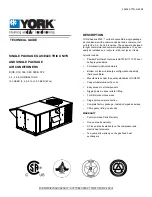
507043-04
Page 3 of 9
Issue 1832
Figure 1. Clearance Requirements
Do Locate the Unit:
• With proper clearances on sides and top of unit (a
minimum of 12” on the three sides, service side should
be 24” and 48” on top
• On solid, level foundation or pad
• To minimize refrigerant line lengths
Do Not Locate the Unit:
• On brick, concrete blocks or unstable surfaces
•
Near clothes dryer exhaust vents
• Near sleeping area or near windows
• Under eaves where water, snow or ice can fall directly
on the unit
• With clearance less than 2 ft. from a second uni
• With clearance less than 4 ft. on top of unit
Indoor Coil Piston Selection
The outdoor section must be matched to a factory approved
indoor section. It is mandatory that the installer ensure that
the correct piston or TXV is installed in the indoor section.
If necessary remove the existing piston and replace it with
the correct piston or TXV. See indoor unit instructions
for details of changing the piston or TXV. Contact your
distributor for accessory piston kits.
The correct piston size is shipped with the outdoor unit,
and also listed in the specification sheet. Do not use the
piston that comes with the indoor unit, unless it matches
the one listed on the outdoor unit.
Refrigeration Line Sets
Use only refrigeration grade copper tubes. Split systems
may be installed with up to 50 feet of line set (no more than
20 feet vertical) without special consideration. For lines 50
feet or longer, refer to long line set guidelines.
Do not leave the lines open to the atmosphere for any
period of time, moisture, dirt and bugs may contaminate
the lines.
Filter Drier
The filter drier is very important for proper system operation
and reliability. If the drier is shipped loose, it must be
installed by the installer in the field. Unit warranty will be
void, if the drier is not installed.
Model
13/14/16 SEER
Liquid Line
Suction Line
18
3/8
3/4
24
3/8
3/4
30
3/8
3/4
36
3/8
7/8
41
3/8
7/8
42
3/8
7/8
47
3/8
7/8
48
3/8
7/8
59
3/8
1-1/8
60
3/8
1-1/8
* Fittings should be supplied by the installer.
Table 1.
Installation of Line Sets
DO NOT
fasten liquid or suction lines in direct contact with
the floor or ceiling joist. Use an insulated or suspension
type of hanger. Keep both lines separate, and always
insulate the suction line. Long liquid line runs (30 feet or
more) in an attic will require insulation. Route refrigeration
line sets to minimize length.
DO NOT
let refrigerant lines come in direct contact with
foundation. When running refrigerant lines through the
foundation or wall, openings should allow for a sound
and vibration absorbing material to be placed or installed
between tubing and foundation. Any gap between
foundation or wall and refrigeration lines should be filled
with a vibration damping material.



























